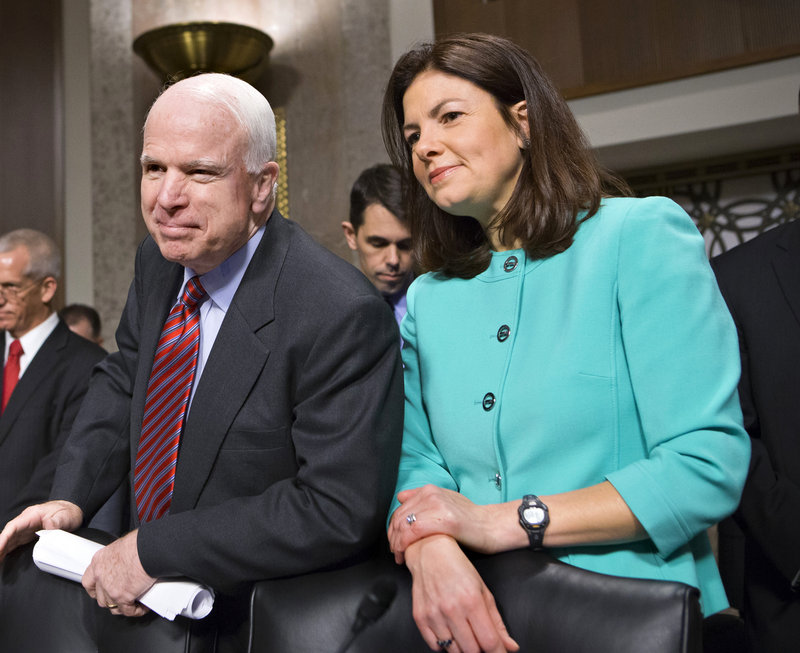WASHINGTON – The House took its first step to avert a government shutdown on Wednesday as President Obama began a series of rare meetings with Republican lawmakers, reviving chances for a long-term deal to reduce the deficit.
Washington looks to forgo forcing a fiscal crisis this month, as the House approved a six-month spending bill that would fund the government through the end of the current fiscal year. The measure passed 267 to 151, with most Republicans supporting it and most Democrats, including Maine Reps. Chellie Pingree and Mike Michaud, voting against it.
The stopgap measure provides $982 billion, enough to keep federal agencies humming past March 27, when the mechanism currently funding the government expires. But it would lock in the across the board spending cuts known as the sequester for the rest of the fiscal year.
The bill now heads to the Senate, where Democrats are likely to seek amendments to help blunt the impacts of the domestic spending cuts begun last week. There is bipartisan optimism that a final version of the bill will clear Congress by the end of the month.
With a government shutdown now unlikely, Obama is turning his focus to a new round of talks that the White House hopes could break Washington’s fiscal impasse. After more than two years of negotiations with Republican leaders failed to achieve a “grand bargain,” Obama is courting rank-and-file Republicans he believes might be interested in a deal pairing cuts to entitlement programs with a tax overhaul that would include new revenues.
The president invited a group of GOP senators to dinner Wednesday at a neutral, and tony, location: the Jefferson Hotel in downtown Washington. Aides said his focus would be fiscal issues, but that the president also would discuss such priorities as immigration reform and gun control.
Next week, Obama will make a rare trek to Capitol Hill to meet separately with the Democratic and Republican caucuses in both the House and Senate.
There appears to be a growing appetite among leaders at both ends of Pennsylvania Avenue to strike an accord that has eluded them throughout Obama’s presidency.
A few hours before dining with Obama, Sen. Dan Coats, R-Ind., told reporters: “My message is, ‘Mr. President, we’ve been dealing with short-term, buy-a-little-time stuff for two years now. Isn’t it time to reach some kind of big deal that puts this behind us and sets a course for the next 10 years, removes this dark cloud of uncertainty that’s hanging over the economy and gives us a clear path forward?’ “
Obama’s new charm offensive marks a departure from his more combative recent negotiating style. With across-the-board spending cuts known as the sequester now taking hold, White House aides said Obama sees an opportunity for productive discussions with Republicans over how to replace the sequester with a more thoughtful deficit-reduction plan.
Aides say Obama accepts that the sequester cuts are here to stay, for the moment at least. But he wants to replace them quickly with a deal that includes overhauling entitlement programs such as Medicare and Social Security in exchange for raising $600 billion in new revenue by overhauling the tax code.
Entitlements were shielded from the sequester, which was designed to hit year after year for the next decade and total $1.2 trillion in cuts. If it continues, domestic and military programs would continue to be hit particularly hard.
White House aides said they are encouraged by recent comments from Sen. Lindsey Graham, R-S.C., and other Republicans that they are willing to consider a “grand bargain” that includes tax increases, although GOP leaders have resisted any new tax revenue.
The first step toward a broader discussion was ensuring that no major showdown occurs this month over simply keeping the government operating.
The measure passed by the House on Wednesday would provide new flexibility to the Pentagon to manage the sequester’s deep spending cuts, but would otherwise leave the reductions in place for the year.
House Democrats pushed to be allowed to vote on an alternative that would replace the sequester with a mixture of higher taxes and different cuts.
To register their unhappiness with allowing sequestration to remain in place, 137 Democrats voted against the bill, authored by GOP leadership. Fifty-three Democrats joined 214 Republicans in voting for it. Fourteen members did not vote.
“This has an impact right at the kitchen table for the American people,” said House Minority Leader Nancy Pelosi, D-Calif., who voted no.
Send questions/comments to the editors.



Success. Please wait for the page to reload. If the page does not reload within 5 seconds, please refresh the page.
Enter your email and password to access comments.
Hi, to comment on stories you must . This profile is in addition to your subscription and website login.
Already have a commenting profile? .
Invalid username/password.
Please check your email to confirm and complete your registration.
Only subscribers are eligible to post comments. Please subscribe or login first for digital access. Here’s why.
Use the form below to reset your password. When you've submitted your account email, we will send an email with a reset code.